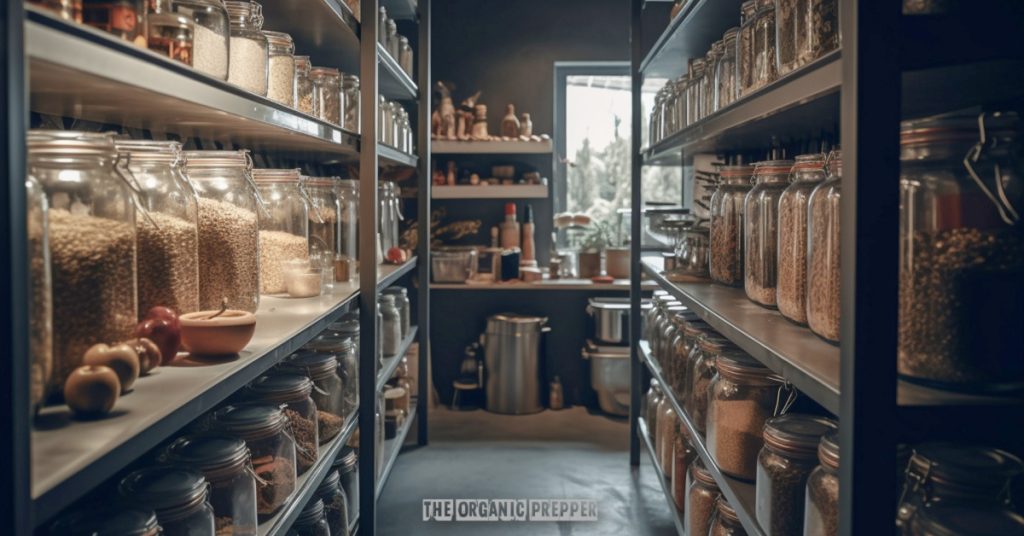If you're new here, you may want to subscribe to my RSS feed. Thanks for visiting!
I came across this really great video from my friends over at Mind4Survival and it was so helpful, I wanted to post it here.
There are some stockpile foods you can store that never expire, no matter how long you have them, as long as they are stored correctly. They make the backbone of a fantastic stockpile, too.
Check it out below. And please, do me a favor and subscribe to this channel. Brian puts out great content like this as well as insightful interviews that will help you be better prepared. It’s all done very positively and I really enjoy the channel and would love to see it grow.
Looking for more advice on pantry building?
For more information on building a stockpile, check out my online course here and my book here.
What do you think about these stockpile foods?
Are there any other foods you can keep basically forever? Have you had good luck with the foods above?
Let’s talk about it in the comments section.

















26 Responses
Powdered milk makes great yogurt! Simply mix, heat to just below boiling for about 5-10 minutes, then cool to “baby bottle temp”. If you want to add vanilla, add it before you take it off the heat to cook off the alcohol, and add sugar if you want it sweeter. Once cool, add yogurt starter (I use Fag’e greek, or Stonyfield organic). You can add sugar to the culture, or molasses or honey. Whisk well, to fully combine, then put into a clean glass bowl, or individual jelly jars, and set into a pan of hot water on top of a towel on top of a heating pad, or in a place with consistent warmth. Cover and wrap in a towel and walk away for 8-12 hours. Yogurt will “yog” faster if you put it into small containers. The water bath acts as an insulator so your yogurt culture doesn’t get too hot or too cold. The heating pad provides consistent heat.
If you use individual jelly jars, you can put fruit or jelly in the bottom, and cultured milk on top, then let it process for ~8 hours. Better than Dannon fruit on the bottom yogurt! Or, you can add the fruit after it has developed. Jelly jars make it easy to carry to work for lunch. If you strain off the whey, dry it for protein powder, or save it to add to baked goods or cream soups or smoothies. Totally love to keep powdered milk on hand! Food pantries give it away all the time, and people don’t like to take it because they don’t know what to do with it. I have a friend who volunteers at a pantry, and they are constantly inundated with powdered milk, and they rotate it out, so I take it when it is available.
You do NOT have to add sugar if you prefer a more tart yogurt.
I believe that powdered milk contains milk fats which can go rancid in extended storage.
Most milk powders are non-fat
Got most of this covered except instant coffee and baking soda. That will be fixed this weekend.
He managed to list all the long-term storage items one would require. Will have to look at this video again to see if something was missed. Believe pepper corns (whole) if kept in vacuum sealed jar should be added to the list of items for your long-term storage plan.
Canned meat/fish, veggies require no reconstitution involving water which could possibly be scarce during grid down scenarios. That would be an issue with dried rice and beans. Also they can be consumed without heat if need be if no source for cooking and also creates no odors that might attract those who are hungry. Also I see no mention of oil ie olive, vegetable etc, nor mention of ghee, rendered butter which has a very long shelf life and requires no refrigeration. Another omission is having yeast available for fermentation to make alcohol or used in baking. All food for thought.
That was a very, very good list. He included all the things I was going to add. And yet, there are a couple of things–minerals and supplements. And spices. The cheapest mineral supplement is unrefined sea salt. Note: there is no legal definition of “sea salt,” which means all the minerals have been refined out of it if it is white salt. Redmond’s sea salt and Himalayan Sea Salt are two that Nature has been storing for millions of years, and Celtic Sea Salt is a current one from current seas on the west coasts of Europe.
+1 on Celtic Sea Salt. It tastes amazing.
See my notes below the video detail I copied from inside that YouTube listing.
15 Foods to Stockpile That Never Expire | Essential Long-Term Food Storage
per this 17:17 minute video, from Mind4Survival – Survival Prepping & Self-Reliance on Jun 7, 2024
https://www.youtube.com/watch?v=xZZIiHAuZ44
Plus this transcript link:
https://www.youtube.com/watch?v=xZZIiHAuZ44
Plus several related YT video links.
Plus 4 comments, and counting.
Notes: this is a “Children’s Digest” version about food storage. It does not cover some vital basics. For example … it does not mention the problem of arsenic contamination of rice grown in what used to be US southern states cotton growing fields — or how to remove at least some of that contamination (see details on YouTube). Nor does it mention recent reports of pesticide contamination of rice coming from India.
https://greatgameindia.com/over-400-indian-food-products-contaminated-with-cadmium-pesticides-and-fungus-report/
Some rice packaging fails to disclose where that rice was grown. IF there’s no phone number on such a package or a phone operator on the seller’s end who either is unable to or refuses to disclose the geographic origin of that rice product … BEWARE.
Rice grown in California does not have that former cotton field history so rice grown there does not have the arsenic problem. Walmart carries some California rice from Lundberg farms … however it is a bit more expensive per unit.
It does not mention the long term benefits of storing whole grains, beans or nuts until one is ready to grind the day’s (or week’s) needs into flour or nut butter. That can benefit one enormously by greatly conserving on cooking time, saving on cooking fuel energy … while preserving the longevity of as-yet-unground whole foods.
It does not mention the nutritional trade-off between canning versus dehydrating foods. The owners of dehydrate2store.com explain that foods that respond well to dehydrating (which is most, but not all) preserve about 90% of their original fresh-picked nutrition. Compare that with somewhat just under 50% for canned foods.
It does not discuss the problem of losing one’s cool place to store such foods during a long term power outage …as well as some workarounds that must be put in place long before such a calamity.
It only demos the use of traditional can openers that often leave sharp (and often jagged) edges and bent unreusable lids. In contrast today … a manual side-cutting can opener solves all these problems and creates a safe and smooth can edge plus a reusable lid. Such reusable cans can provide safe storage (with or without the reusable lid) for countless small items while the larger sizes can be made into emergency rocket stoves for cooking … with smooth edges that won’t rip nasty tears in your hands and fingers.
–Lewis
He lists canned meat and vegetables. Does that include home canned meat and vegetables, or just commercially canned?
Yes. My neighbors are canning venison and pork from their freezers for long term post-grid storage.
Commercially canned lasts far longer than home canned.
Always buy honey in glass jars… no plastic, please.
Ohhhh, vanilla never goes bad either. must for prepper supplies.
I wish he had mentioned freeze drying as a better form of storage. You eat too many canned foods and you are exposed to the crap they line the cans with. I would also think the greatly reduced weight of freeze dried items means you can carry a lot more. I realize you need water, but you’re going to need water anyway (unless you’re a camel) so I would avoid canned foods for the most part.
I have stored Flour in bulk by vacuum packing it . So far i have tested five year old flour to great success.
Is there a source for powdered RAW milk? Is there such a thing?
If you purchase your own Raw milk, and then freeze dry in your own freeze dryer, I think that would be the only source. In most states, you can not sell raw milk/dairy, except as “animal feed”. If you have a herd share of a good dairy, you can procure your own raw dairy from a cow that you partially own.
Brian did a great job, kept it simple. There’s still alot of people out there that need this basic info. Keep prepping folks!
Hi Daisy! I wasn’t sure where to email you about the book you wrote: The Prepper’s Canning Guide so thought I’d try here. I love this book! I’ve done lots of stuff in a water bath canner for years but wanted to try doing meats and meals, so I ordered your book. It is great. You explain everything so well, you make it easy to understand and have great recipes. I have tried one of the recipes, worked slick, and am trying another tomorrow. Thank you for your help!
I’m so glad to hear that! Thank you for letting me know!
P.S. I made sure to leave a review on Amazon!
Thanks, one question, I have heard that commercially canned tomatoes will not keep well due to the high acid. True?
What about freezing dark chocolate in an airtight container? You can put it in the refrigerator first then into the freezer.
I just pulled a jar of plum jam out of my pantry. Date: 2014. And it’s still perfect. It may not be a forever food, but 10 years is a good start.